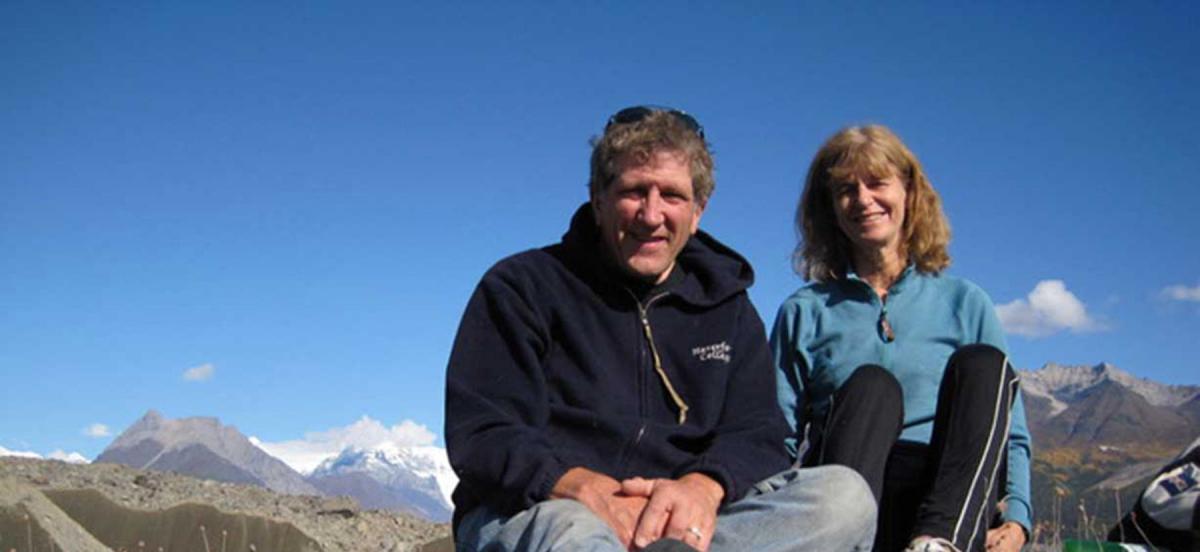Unearthing Alaska’s Past

Peter Bowers and his wife, Peg, on a hiking trip in the Wrangel Mountains of Alaska, where he has lived since 1974.
Details
Archaeologist Peter Bowers '74, principal investigator for a project in central Alaska that discovered the Upward Sun River site that dates back to the time of the Bering Land Bridge, has adopted that state as his home.
More than a few times while working in his adopted state of Alaska, archaeologist Peter Bowers ’74 would look at the surrounding mountains, forest, or coastline and think, “I can’t believe I’m getting paid to be out here.”
It was a career he nearly didn’t have. “After graduation, my bags were packed and I was going to drive home to Bucks County [Pa.], when I went to check my mailbox one last time,” he recounts. Inside was a letter with a summer job offer as a research assistant, mapping late Ice Age sites in Alaska. “I left thinking it would be a fun summer, but by the end of that first season, I ended up deciding, ‘I’m never moving back.’ The beauty of Alaska is spectacular.”
An anthropology major and the great-grandson of Isaac Sharpless, Bowers was keenly aware of Haverford’s history, though it was the newly formed varsity lacrosse team that initially drew him in. One of his major influences once he arrived on campus, however, was celebrated Alaskan anthropologist Frederica de Laguna, who founded Bryn Mawr’s anthropology department and shared her experiences with Bi-Co students.
Her stories piqued Bowers’ interest in the Arctic and eventually his lifetime dedication to archaeology, a key component of cultural resource management, which involves surveying blocks of land ahead of development projects, then evaluating the sites for their historic and cultural importance.
After his summer job ended, for example, Bowers joined a group that was excavating the Trans-Alaska Pipeline route just ahead of the bulldozers. A major find at that site: stone tools dating back 10,000 years. He later worked with a program connected to the Exxon Valdez oil spill, surveying thousands of kilometers of coastline.
In 1991 he and three colleagues started their own cultural resource management firm, Northern Land Use Research, Inc. (Bowers retired and sold his interest in 2012), and he worked on nearly 500 projects throughout Alaska, at sites dating from the late Pleistocene epoch to the Gold Rush to World War II.
On Alaska’s west coast, the company worked at an Inupiat village that was having sewage and water lines installed for the first time. “We discovered some really spectacular, carved walrus ivory artifacts dating back 2,000 years,” says Bowers, who also found graves and ancient houses buried underground.
And in 2006, he was principal investigator for a project in central Alaska that discovered the Upward Sun River site, dating back 11,500 years to the time of the Bering Land Bridge. Bowers’ colleagues from the University of Alaska continued research on the site once his company completed its studies, and in 2010 the ancient remains of an infant were discovered. DNA was extracted from the bones, and in a paper published in January in the journal Nature, an international team of scientists reported on this previously unknown population, dubbed Ancient Beringians. The discovery, according to The New York Times and other media outlets, sheds light on how people first arrived in the Western Hemisphere.
“It’s a spectacular finding,” Bowers says. “And that’s what pointed me to Alaska in the first place. It’s the excitement of discovery and Alaska being the last frontier.”
Bowers embraced other aspects of the Alaska lifestyle. From the late 1970s to the 1990s, for example, he raced sled dogs. In 1985, he competed in the Yukon Quest 1,000-mile sled-dog race, which goes from Whitehorse, in the Yukon Territory, to Fairbanks, Bowers’ home. “It took me more than a week to complete the race, at temperatures down to 40 below zero,” says Bowers. “[Former Haverford Athletic Director] Dana Swan’s famous quote helped me get through it: ‘Rest when you get there.’ ” Bowers also has become a part of the Alaska music scene. He currently plays in two bluegrass/ Americana bands, one of which, the Norris Bowers Band, includes his son, who is an Alaska-based professional musician, as is Bowers’ daughter.
In addition he continues to write for journal publications about several projects he’s worked on in the past. Since retiring, he and his wife spend winters in Tucson, Ariz., riding bikes and hiking in the desert. “But we don’t plan to leave Alaska,” says Bowers, who explains that friends there are like family, because so many people are far from their original homes. “Plus I never get tired of the natural beauty.”



